
Ch09: Footnotes
The Event Horizon
The Dispossessed
Idyllic State
Purpose of Law
The Middleman
Noble Capitalist
The Noble Estate
Legal Theft
With his large steady income from rents and the sale of raw materials, the noble estate-owner has lots of time on his hands with lots of money to spend. So he ventures into the world and into thought, from which he emerges to establish a global market, the exploitation of which only he can capitalise.
The nobleman still has his Estate. The difference now is that he does not have to operate it as an all-providing economic unit. He can just sit back while the wealth rolls in. In flows the rent from land he has leased to the new Middle Class employer/ suppliers, some of whom are still tenant farmers. He also receives revenue from the sale of his wood and stone which others cut and hew.
With this bounteous income he hires every specialist skill to aggrandise his home and manicure his Estate. He adjusts rents and prices so that he can afford all that he desires without jeopardising the livelihoods of the Middle Class employer-cum-suppliers (the geese who now lay his golden eggs). However, his greatest gain from this new relationship with his former slaves is time.
Having all their needs provided and time on their hands, some of these noble landlords embark on lives of extravagance and high living. Some however devote their spare time and effort to art, literature, philosophy, mathematics and science. Their ancient nomadic spirit becomes curious about lands far away. They ponder the size and shape of the Earth. The layout of the continents. The social structures, wealth and produce of other civilisations. And the possibility of exploiting them for profit.
As a result, great leaps forward are made in navigation. The children of the ancient nomads once again strike out across the globe. But this time as noble adventurers in ships: designed by engineers, built by artisans, guided by astronomers, financed and armed by kings. They discover new continents. New limitless supplies of both common and exotic raw materials there for the taking. Endless legions of defenceless labourers ready for enslavement. Gullible tribes ripe for stripping of their natural heritages. Naive consumers who will buy anything that intrigues them. All this suddenly precipitates a quantum leap in the demand for goods.
Meanwhile, those with the time and the means continue their studies of art, literature, philosophy, mathematics and science. These precipitate a further advance in navigation from which materialises a global transport and communications infrastructure. This facilitates easier travel for ever more elaborate expeditions to explore and open up trade links with new continents. And this accelerates the formation of a world market.
These academic studies also precipitate further advances in production technology and more efficient methods of deploying labour. Mechanisation is increased. Productivity soars. Trade multiplies. Every nation on earth is sucked into a global market. New sources of raw materials and labour reduce production cost and increase profit. This unleashes even more rapid developments in global communication and exchange. Then the effect comes full circle, driving industry to expand ever further and faster in an endless super-regenerative loop of action and reaction.
Adventurers return and present the Middle Class employer's small firm with a sudden demand for its goods from a country far across the sea. New products must be created and old ones adapted to foreign needs. New skills have to be acquired and then discarded. It is all moving too fast for a small firm to cope with.
A capitalist is someone who possesses enough private means (capital) to be able to hire the labour of others and re-sell that labour for a profit. He can do this directly by employing labourers and then hiring them out to a customer at a profit, or indirectly by employing labour to transform raw materials into goods which he sells on the open market for a profit. By this definition the employer-artisan is a capitalist. Unfortunately, the tenuous source of his capital critically limits his effectiveness as such.
The only possible source of the employer-artisan's capital is his profit. His capital must therefore necessarily start small and build up gradually.
At first it is the little he is able to accumulate out of his income as a lone artisan that is above the minimum meagre subsistence that he is able to exist on. After sufficient time, this is enough to pay for the hire of one labourer and acquire the accommodation and tools with which that labourer can work. His rate of profit is now increased by the difference between what he gives his labourer and what he can get for the fruits of that labourer's work. The speed with which his capital grows therefore increases. Soon he has enough to take on more labourers and so further increase the speed at which his capital increases. His capital thus grows exponentially. Eventually his capital becomes substantial. It is now far more than he needs to hire as much labour as he wants when he wants. He is now a true capitalist. But he is not a heavy-weight. And he never will be.
This steady exponential growth from lone artisan to a large employer of mass labour can only take place if the market obliges. The market for a brand new invention may do. This allows those who are first in the field to become established and dominant. But their dominance can be short-lived. The market for an established commodity — especially the global market — does not oblige in this way. It requires its players to go in big and fast. If you don't, someone else will. This requires a very large and instant source of ready capital. No player can afford to wait for his own profit to generate the necessary capital. It has to be there to start with.
The Middle Class employer has no large and instant source of capital. The slow exponential climb of his profit-generated capital prevents him from expanding production fast enough to meet a sudden new demand from the global market. The noble Estate on the other hand, is itself a vast reserve of instantly-available resources. These can be used to capitalise a large-scale enterprise almost overnight to satisfy any sudden demand from anywhere in the world.
The nobleman's land is able to produce the needs of life unilaterally and independently of the free market. And it can provide them for far more labourers than are required to plant, tend and harvest them. That is why the nobleman originally jettisoned most of his dispossessed settlers into the free labour pool. So he now takes back his once rejected labourers to power his new enterprise in return for their food, clothing and shelter which he generates and provides for them directly from his estate.
From the raw materials within his estate he sets them to work building homes and enormous factories for his new enterprise, after which he sets them to work in these factories producing goods for the new world market. He has thus mobilised the resources of his inherited estate to capitalise and bring into being a new vast enterprise in time to meet the demand.
The enterprise of the noble capitalist is therefore far more flexible than the feudal estate of his ancestor with its fixed resident labour force. He hires his labour from the free labour market. He chooses from its vast range of available skills. He gets whichever skills he wants in whatever quantity he wants, of whatever quality he wants, for as long as he needs them. Then he simply fires them.
He adopts the emerging technologies of mechanised production which, by their nature, can be implemented successfully only on a large scale. This amplifies the productivity of each of his workers far beyond what is possible in the small workshop-cum-factory of the employer-artisan. The nobleman pays no land rent for his factories. They are built on his own land. His land supplies the raw materials and fuel directly — or indirectly by exchanging them for different raw materials from somewhere else.
This gives the nobleman's enterprise a productive capacity capable of meeting the demands of a booming global market, while its overheads — unlike those of the Middle Class employer's profit-capitalised factory — do not eat away his capital when the market recesses and demand falls. It simply lives off the land of its owner's estate on which it is built. The large-scale enterprise capitalised by the land-based resources of a noble estate thus emerges and takes up its position as the undisputed heavy-weight of the global free market.
The capitalists have complete and exclusive possession of the land (the only generator of the needs of life) and the free market (the only source through which the needs of life may be acquired by common man). And because the capitalists alone now own all land, they make the land also a commodity that they can buy, sell and exchange on the free market.
With their larger size, greater flexibility and much reduced vulnerability to market fluctuations, these larger estate-capitalised enterprises of the noble entrepreneurs dwarf those of the small employer-artisans in every way. But the noble capitalists do not only have a size advantage. They also have a credibility advantage. As noblemen they have noble names. These are known and respected much further afield than are those of the employer-artisan. They are known nationally as if they were local. They are also known in the foreign lands which their adventurer peers are colonising. Thereby, all over the world, they are household names.
All buyers are human. They are therefore limited by human physiology. One limit of human physiology is the limit of approximately 150 as the number of people one individual can know and trust. He has to know and trust those from whom he buys. An individual is usually part of a nuclear family. This, in turn is usually itself part of an extended family. He also usually has friends whom he would rank among those he trusts. These probably account for say, for the sake of argument, about 50 out of his possible 150. This leaves about 100 others which that individual can come to know and trust as part of his anthropological community.
From the time of the ancient settler to the time of the freed artisan that 'other 100' was almost all within the individual's local community. All could be seen and dealt with face-to-face. Then, when the employer-artisans ousted the lone artisans, markets became regional. They were bigger geographically. Nevertheless the individual's capacity as to the number of people (or commercial entities) he could come to know and trust remained the same. Consequently, the number of suppliers in the region simply had to fall. They had to become fewer and bigger.
Now, by their larger size, greater flexibility and reduced vulnerability to market fluctuations, the commercial leviathans of these noble capitalists are displacing the small employer-artisan from his regional market. And not only in their own country, but in every other country and colony on Earth. Yet still the individual's capacity as to the number of people (or commercial entities) he can come to know and trust remains the same. Consequently, the number of suppliers in the world simply has to fall. They are again in the inevitable process of becoming fewer and bigger.
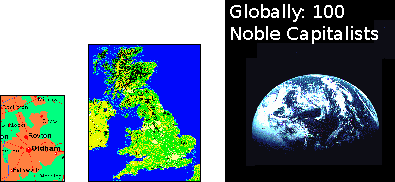
Of course, not everybody wants to buy every kind of good there is. So there is room in a market for more suppliers than could become known and trusted by one individual. Nevertheless, in any market, irrespective of its size, there is room only for a relatively small number of 'trusted' suppliers.
The ones who survive as part of the 'known 100' which people trust are those who possess the known noble name and the power to keep that name in the forefront of everyone's mind. The noble capitalist has that name and power. The small employer/artisan does not. All economic activity thus gravitates into the lap of the noble capitalist. The original rich plethora of small artisanic firms become suffocated by these fewer larger capital leviathans. Finally, both the artisans and their employees slowly sink together into the universal pool of available wage-labour.
The employer-artisan does not disappear completely, however. He is far more of a lateral thinker than his noble competitor. Technologically he is much more agile. He can invent and develop a new product far more quickly. But what he cannot do is market it. In the wider global market he is far too small to break into the 'known 100' of the consumer mind.
Nevertheless the free spirit is renewed in each rising generation. A new army of artisan entrepreneurs is fired once again with the will to survive and succeed. Even against the impossible odds of a global free market crushingly dominated by large capital. Encouraged by capitalist-puppet governments, they start up, they invent, they thrust all their energy and waking hours into developing and producing their new products. They travel endless miles trying to sell them. They finally manage to sell just a few in their local niche market. The capitalist's scouts watch and wait.
A capitalist spots a product he likes. One he thinks will sell in quantity. He looks to see if his vast enterprise can 'reverse-engineer' and thence produce a similar one. But not too obviously or infringingly similar. If he can do this, he goes into production. With his global name and his vast capital he pushes the small-time developer of the original product out of the small market he had and then goes on to sell it to the world.
If he does not have the necessary expertise within his vast organisation he tries to steal the design details of the artisan's product. Failing this he tries to buy them. Failing this he tries to poach the appropriate technical employees from the artisan's firm, or better still, buy the firm. If all else fails, he offers to sell the product in the global market which the artisan himself could not otherwise reach. In return for which he alone has the right to sell the product and to hold on to the lion's share of the profit.
The small firm of the employer-artisan is thereby destined to be a short-lived enterprise. It is born to develop a new idea, product or technology and test its acceptability in the market. If it fails it sinks into oblivion. If it is successful it is sooner or later absorbed by one of the two or three capitalist enterprises in the world which deals with that kind of product. Even if it does manage to retain its nominal independence, the small developer is destined to become no more than a captive satellite of the capitalist's enterprise.
Hence, the small firm of the employer-artisan is born with the energy and enthusiasm of youth. It grows. It matures. It blooms for a fleeting moment like a desert flower after the spring rains. Then it dies.
Thus, its proprietor — for all his traumatic efforts — is destined to join the ranks of the unemployed. For the very nature of that free spirit which inspired him to embark upon his original venture causes the capitalist to perceive him as psychologically unsuitable to become one of his passive and obedient employees. He is thus forever locked out of the free market system. Since he has no other means of turning his labour into the needs of life, he lives without hope.
Thus with the passive blessing of the noble capitalist, the small firms of the Middle Class employer-artisans are condescendingly allowed to be born, blossom and die in endless insidious procession. Generation after generation they furnish his vast corporate empire with a rich harvest of new ideas, technologies and products. These he takes and uses to swell his profits and thereby funnels an ever-greater proportion of the capital production of all human labour into his private possession and control.